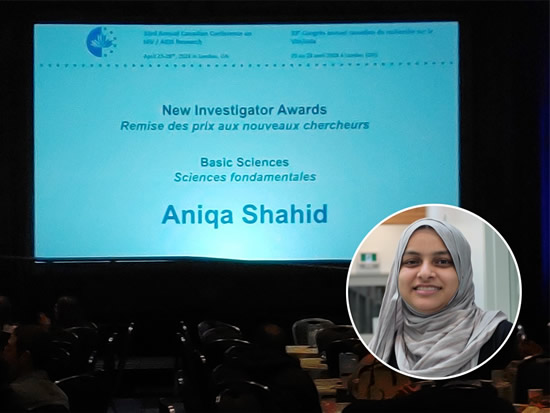FHS PhD candidate wins national research excellence award
by Sharon Mah
May 13, 2024

FHS PhD candidate Aniqa Shahid was named the top young HIV basic sciences researcher in Canada by the Canadian Association for HIV Research (CAHR) at their 33rd annual conference in London, ON
PhD candidate Aniqa Shahid has won the Canadian Association for HIV Research’s (CAHR) New Investigator Award for Basic Sciences!
The award is given to the top young HIV basic sciences researcher in Canada who presents their work at CAHR’s annual conference.
This year, Shahid presented the findings from her recently published paper, “The replication-competent HIV reservoir is a genetically restricted, younger subset of the overall pool of HIV proviruses persisting during therapy, which is highly genetically stable over time” (link)
Modern antiretroviral therapies that are used to treat HIV are incredibly effective, but these medications must be taken for life. This is because HIV persists in the body even during long-term treatment. The copies of HIV that persist are called the "viral reservoir." Shahid's research seeks to understand reservoir evolutionary dynamics – that is, when these HIV copies first entered the reservoir and how long they persist there. Understanding this is critical to developing an HIV cure.
In her award-winning study, Shahid reconstructed HIV's within-host evolutionary histories in seven women living with the virus, and leveraged this information to understand their viral reservoirs. She found that participants viral reservoirs preserved HIV copies of a wide range of ages, from very old HIV sequences that entered the reservoir shortly after infection, to "younger" ones that were created around the time of therapy initiation. But, many of these persisting HIV copies, particularly the older ones, were genetically defective. In contrast, when Shahid specifically examined replication-competent viruses that emerged from the reservoir when HIV therapy was interrupted, she found that these were a genetically restricted and overall "younger" subset of HIV sequences. The key implication of this research is that HIV cure strategies may need to eliminate a reservoir that differs in key respects from the overall pool of HIV sequences that persist in the body.
Shahid was one of five new investigators honoured at the 33rd Canadian Conference on HIV/AIDS Research recently held in London, Ontario. The New Investigator Award recognizes promising new researchers in the areas of basic sciences, clinical sciences, epidemiology and public health, social sciences, and key populations research tracks.
Aniqa Shahid is supervised by FHS professor and British Columbia Centre for Excellence in HIV/AIDS Laboratory Director, Zabrina Brumme.
Media Contact:
Ray Sharma
Communications Associate, Media Relations and Public Affairs |
Communications & Marketing
Simon Fraser University | 2200 Strand Hall
8888 University Dr., Burnaby, B.C. V5A 1S6
ray_sharma@sfu.ca
T: 778.782.3210 | C: 236.880.3297
sfu.ca | Twitter | LinkedIn
Source: Simon Fraser University - FACULTY OF HEALTH SCIENCES
https://www.sfu.ca/fhs/news-events/news/2024/phd-candidate-wins-national-research-award.html
"Reproduced with permission - "Simon Fraser University"
Simon Fraser University
For more HIV and AIDS News visit...
Positively Positive - Living with HIV/AIDS:
HIV/AIDS News |